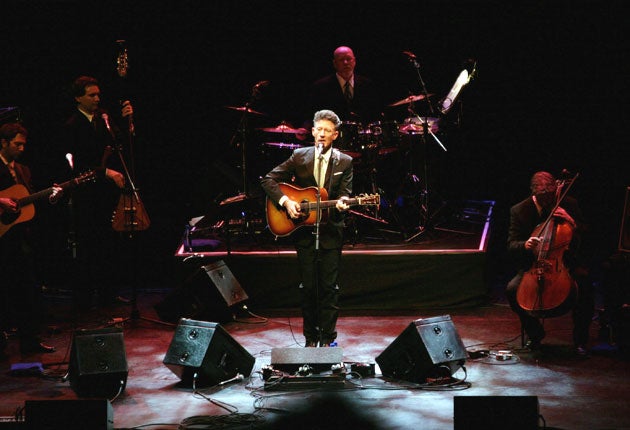Lyle Lovett, Royal Festival Hall, London

Lyle Lovett has made his way in Hollywood and Nashville. But "That's Right (You're Not From Texas)" could be his keynote song during a more than two-hour show exploring his home state's most profound traditions. The four-piece band play bluegrass and Western Swing with classical precision. Lovett's deceptively strong voice can croon or croak, part of an equally precise yet elastic persona: sardonic, rowdy, undone or lost in reverie. His long, stone face recalls tragicomic Buster Keaton, and his songs hang suspended between shaggy dog tales and quiet desperation.
His lyrics feature lonely figures in wide empty landscapes or emptier rooms in America's country heartland, the South and Midwest. When a Texan woman foolishly ventures further afield in "LA County", the hectic bluegrass song ends with a darkly vivid tableaux: her kneeling to marry the best friend of a narrator aiming his pistol. "Since the Last Time" takes a break for exultant "Hallelujahs!" as the band kick up a storm, before the coffin lid closes on its storyteller, bored to death at his own funeral.
Keith Sewell's mandolin is the star instrument, and Lovett leans in to sing with him in a carefree way. There are plenty of hectic barn-dance hoedowns, and back-room jokes such as hilarious marriage warning "She's No Lady". But when Sewell recalls Deliverance's "Duelling Banjos" on "Don't Cry A Tear", it slows to stately mourning for a relationship.
Lovett's hesitancy add to his comic timing (a drunken cry of "I love you Lyle!" brings the instant response: "I'm sorry.") "If I Had a Boat", his prettiest melody, is equally absurd and touching in its engagement with Western icons. "North Dakota" is still more self-conscious of Lovett's relationship with straighter country stars. "So I drank myself some whiskey," he sings, "and I dreamed I was a cowboy". But in "South Texas Girl", Lovett uncovers simpler, deeper power. It's an autobiographical reverie which sees him move from innocence to experience, yet stay the same in his heart and hopes. The song "Ain't No More Cane" then reaches back to bring the turn of the last century into the room. High mournful, three-part harmonies are haunting. Even the hardest moments in Lovett's rooted, boundless idea of country have been offered kindly by this gracious man, in a modest master-class.
Join our commenting forum
Join thought-provoking conversations, follow other Independent readers and see their replies
Comments
Bookmark popover
Removed from bookmarks